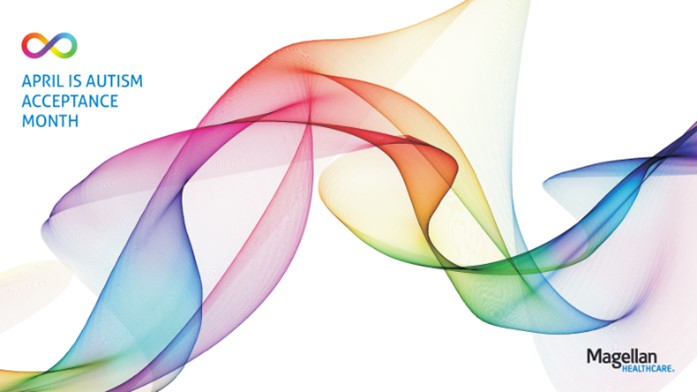Autism Acceptance Month
Please join Magellan in celebrating Autism Acceptance month this April with resources gathered by Emily Whaland, Lead Autism Care Manager and Larysa Miller, ABA Care Manager. As some are already aware, April was previously referred to as “Autism Awareness” month with April 2nd specifically highlighting “World Autism Day”. As of late, there has been an even greater call to shift the language from “Autism Awareness” to “Autism Acceptance”. This is to match the language and need for acceptance within our communities to promote integration and address barriers to developing supports and inclusion. Awareness is always the goal, but the need is to start and build the foundation of acceptance first. Please reference our Magellan Healthcare Flyer on Understanding Neurodiversity here on the www.Magellanhealthcare.com/autism-resources page.
Please see two special Magellan specific Autism Acceptance initiatives:
- Magellan will be hosting the “1st Annual Autism Community Walk” in partnership with Autism Society Lehigh Valley, NAMI Lehigh Valley, Lehigh County and Northampton County on Sunday April 27th from 1-3 PM at Saucon Park. Event flyer is available here.
- The Autism Action Committee is a collaborative group comprised of representatives from Magellan Behavioral Health of Pennsylvania (Magellan), Lehigh and Northampton County Departments of Human Services, Autism services system stakeholders, and family members. To learn more about joining the Autism Action Committee, reach out to John Lees at jglees@magellanhealth.com.
Other Magellan Healthcare resources on this website include:

“Nothing about us, without us.” Autistic individuals sharing their personal experiences with Autism
- Listen Up: Autistic Youth Need to Be Heard, as published in Pediatrics: pooley-listen-up-autistic-youth-2025.pdf
- How autism freed me to be myself, TEDMED, 2014, Rosie King-Rosie King: How autism freed me to be myself | TED Talk
“People are so afraid of variety that they try to fit everything into a tiny little box with a specific label,” says 16-year-old Rosie King, who is bold, brash and autistic. She wants to know: Why is everyone so worried about being normal? She sounds a clarion call for every kid, parent, teacher and person to celebrate uniqueness. It’s a soaring testament to the potential of human diversity.
- Behind the Mask: Autism for Women and Girls- TedxAustinCollege, Kate Khale- Kate Khale: Behind the Mask: Autism for Women and Girls | TED Talk
“As a woman with autism, Kate will talk about the gender discrepancy in autism diagnoses. Women and girls often display completely different behaviors than what neurotypical people have been taught to associate with autism, which affects when and how (and if) they are diagnosed. Autism being diagnosed at a younger age leads to a higher chance of that child receiving evidence-based treatment, which can help with better life outcomes. This discrepancy is why Kate wants to encourage more research be done on symptoms of autism in women and girls so that they can be more easily and accurately diagnosed in the future.”
- What It’s Really Like To Have Autism- TED-Ed Weekend, Ethan Lisi- Ethan Lisi: What it’s really like to have autism | TED Talk
“‘Autism is not a disease; it’s just another way of thinking,’ says Ethan Lisi. Offering a glimpse into the way he experiences the world, Lisi breaks down misleading stereotypes about autism, shares insights into common behaviors like stimming and masking and promotes a more inclusive understanding of the spectrum.”
Please see these resources to promote your acceptance, advocacy, and show your support.
April 2nd, 2025 World Autism Day- “Light it up Gold” or “Wear Red” to show support of Autism Acceptance on World Autism Day.
2024 Community Report on Autism by the Autism and Developmental Disabilities Monitoring (ADDM) Network funded by the CDC: Autism among 4-year-old and 8-year-old Children: An Easy-Read Summary | Autism Spectrum Disorder (ASD) | CDC
This is an easy-read summary of two reports, covering identifying autism early among 4-year-olds and the number of 8-year-olds with autism.
